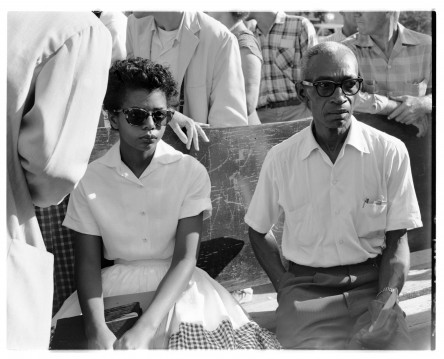With each program, exhibit, and collection it curates, the UALR Center for Arkansas History and Culture (CAHC) strives to shine light on nationally significant events, figures, and issues. The Center’s passionate archivists, led by Director Deborah Baldwin, are doing just that with a new program called “The Road from Hell Is Paved with Little Rocks: Digitizing the History of Segregation and Integration of Arkansas’s Educational System.”
Funded by a $106,908 Digitizing Hidden Special Collections and Archives grant from the Council on Library and Information Resources, the project will archive and digitize over 180 feet of manuscripts from figures on both sides of Arkansas’s civil rights battles, as well as hundreds of related artifacts, audio and audiovisual recordings, maps, and photographs. These items, originating from 1880 to 2012, will be available and preserved together in digital formats for the first time.

Elizabeth Eckford and L.C. Bates sit on a bench outside of Little Rock Central High School, 1957 (Raymond Preddy Photographs, UALR Center for Arkansas History and Culture)
CAHC’s Chad Garrett is providing technical oversight on the project; Sarah Bost is serving as the lead archivist. Digitizing this unique group of archival collections will provide scholars of civil rights, race, education, and law an opportunity to study the evolution of education in central Arkansas through the lens of religion, the judicial system, and contemporary students and educators.
The project will also invite non-academics to learn about this fraught chapter in the state’s history. Through a virtual exhibit, a blog, and a curriculum guide, students, teachers, and visitors from around the world will be able to engage with the voices that fought both for and against desegregation. These new resources will give users a nuanced snapshot of the Civil Rights era in Arkansas.
“Both the crisis and the lawsuits are incredibly difficult to understand without having multiple perspectives,” the project leaders explained in their proposal. “This is the strength of digitizing the collections associated with the crisis. They cover religion (Bishop Brown), education (Huckaby, Vice Principal), the law (FBI School Crisis Report), and a pivotal court case, Aaron v. Cooper, which resulted in closing the high schools for 1958-1959 (Judge Lemley).”
CAHC is collaborating with the Central Arkansas Library System’s Butler Center for Arkansas Studies and the Little Rock Central High School National Historic Site to guide the project. Materials will be gathered from The National Dunbar Historical Collections, FBI reports, The Office of Desegregation Monitoring, the Little Rock Central High School National Historic Site, and personal correspondence and mementos. 
The Council on Library and Information Resources (CLIR) is funded by the Andrew W. Mellon Foundation.
This article is featured in ORSP’s Research in the Rock magazine, along with other stories about research projects happening at UALR. Request a free copy of the magazine.

